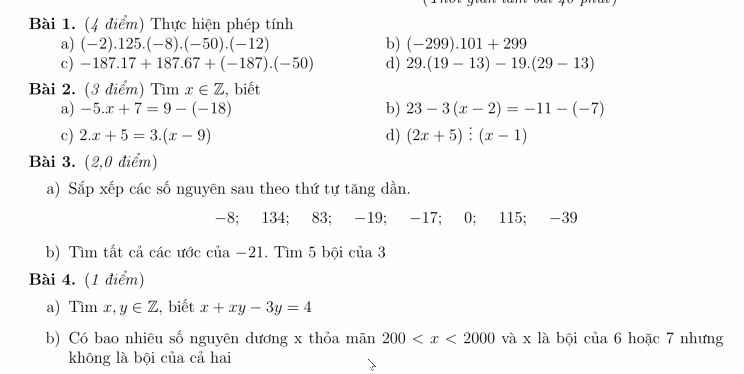
Hãy nhập câu hỏi của bạn vào đây, nếu là tài khoản VIP, bạn sẽ được ưu tiên trả lời.


(-5)3.\(x^2\) = - 1125
\(x^2\) = (-1125) : (-53)
\(x^2\) = 9
\(\left[{}\begin{matrix}x=-3\\x=3\end{matrix}\right.\)
Vậy \(x\) \(\in\) {-3; 3}

2x+1 là ước của 3x+2
⇔3x+2 ⋮ 2x+1
⇒2(3x+2) ⋮ 2x+1
⇔6x+4 ⋮ 2x+1
⇔(2x+1)+(2x+1)+(2x+1)+1 ⋮ 2x+1
Để 3x+2 ⋮ 2x+1 thì 2x+1 ∈ Ư(1)
Ta có:
Ư(1)={±1}
⇒2x+1∈{±1}
⇒x∈{0;-1}
Vậy x={0;-1)

a, 2.3\(x+1\) + 38 = 23.52
2.3\(^{x+1}\) + 38 = 200
2.3\(^{x+1}\) = 200 - 38
2.3\(^{x+1}\) = 162
3\(^{x+1}\) = 162 : 2
3\(^{x+1}\) = 81
3\(^{x+1}\) = 34
\(x+1\) = 4
\(x\) = 3
b, 2\(^{x+1}\) + 4.2\(^x\) = 3.25
2\(^x\).(2 + 4) = 96
2\(^x\).6 = 96
2\(^x\) = 96 : 6
2\(^x\) = 16
2\(^x\) = 24
\(x\) = 4

53 x 172 - 53 x 84 + 12 x 53
= 53 x (172 - 84 + 12)
= 53 x 100
= 5300.
Nếu đúng xin like

\(\left(1-\dfrac{1}{2}\right).\left(1-\dfrac{1}{3}\right).\left(1-\dfrac{1}{4}\right).....\left(1-\dfrac{1}{2004}\right)\)
\(=\dfrac{1}{2}.\dfrac{2}{3}.\dfrac{3}{4}....\dfrac{2002}{2003}.\dfrac{2003}{2004}\)
\(=\dfrac{1}{2004}\)

\(2.3^x+5.3^x.3=153\Leftrightarrow2.3^x+15.3^x=153\)
\(\Leftrightarrow17.3^x=153\Leftrightarrow3^x=9\Leftrightarrow x=2\)
\(\Leftrightarrow2.3^x+5.3.3^x=153\)
\(\Leftrightarrow17.3^x=3^2.17\)
\(\Leftrightarrow3^x=3^2\Rightarrow x=2\)

Ta có: \(4.3^{x+2}-2.3^{x+1}=810\)
\(4.3^{x+1}.3-2.3^{x+1}=810\)
\(2.3^{x+1}\left(2.3-1\right)=810\)
\(2.3^{x+1}.5=810\)
\(3^{x+1}=81=3^4\)
x+1=4
x=3

\(2\cdot3^x-1=53\\ \Leftrightarrow2\cdot3^x=54\\ \Leftrightarrow3^x=27\\ \Leftrightarrow x=3\)
\(2\cdot3^x-1=53\\ 2\cdot3^x=54\\ 3^x=27\\ 3^x=3^3=>x=3\)